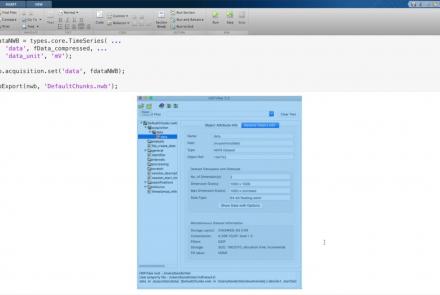Course:
This lesson discusses FAIR principles and methods currently in development for assessing FAIRness.
Difficulty level: Beginner
Duration:
Speaker: : Michel Dumontier
Course:
This lecture presents an overview of functional brain parcellations, as well as a set of tutorials on bootstrap agregation of stable clusters (BASC) for fMRI brain parcellation.
Difficulty level: Advanced
Duration: 50:28
Speaker: : Pierre Bellec
This lesson provides a tutorial on how to handle writing very large data in MatNWB.
Difficulty level: Advanced
Duration: 16:18
Speaker: : Ben Dichter
This lecture provides reviews some standards for project management and organization, including motivation from the view of the FAIR principles and improved reproducibility.
Difficulty level: Beginner
Duration: 01:08:34
Speaker: : Elizabeth DuPre
This lecture gives an introduction to the types of glial cells, homeostasis (influence of cerebral blood flow and influence on neurons), insulation and protection of axons (myelin sheath; nodes of Ranvier), microglia and reactions of the CNS to injury.
Difficulty level: Beginner
Duration: 40:32
Speaker: : Christine Bandtlow
This lecture covers the history of behaviorism and the ultimate challenge to behaviorism.
Difficulty level: Beginner
Duration: 1:19:08
Speaker: : Paul F.M.J. Verschure
This lecture covers various learning theories.
Difficulty level: Beginner
Duration: 1:00:42
Speaker: : Paul F.M.J. Verschure
In this lesson, you will learn about the current challenges facing the integration of machine learning and neuroscience.
Difficulty level: Beginner
Duration: 5:42
Speaker: : Dan Goodman
Course:
This demonstration walks through how to import your data into MATLAB.
Difficulty level: Beginner
Duration: 6:10
Speaker: : MATLAB®
Course:
This lesson provides instruction regarding the various factors one must consider when preprocessing data, preparing it for statistical exploration and analyses.
Difficulty level: Beginner
Duration: 15:10
Speaker: : MATLAB®
Course:
This tutorial outlines, step by step, how to perform analysis by group and how to do change-point detection.
Difficulty level: Beginner
Duration: 2:49
Speaker: : MATLAB®
Course:
This tutorial walks through several common methods for visualizing your data in different ways depending on your data type.
Difficulty level: Beginner
Duration: 6:10
Speaker: : MATLAB®
Course:
This tutorial illustrates several ways to approach predictive modeling and machine learning with MATLAB.
Difficulty level: Beginner
Duration: 6:27
Speaker: : MATLAB®
Course:
This brief tutorial goes over how you can easily work with big data as you would with any size of data.
Difficulty level: Beginner
Duration: 3:55
Speaker: : MATLAB®
Course:
In this tutorial, you will learn how to deploy your models outside of your local MATLAB environment, enabling wider sharing and collaboration.
Difficulty level: Beginner
Duration: 3:52
Speaker: : MATLAB®
Course:
This lesson provides a brief overview of the Python programming language, with an emphasis on tools relevant to data scientists.
Difficulty level: Beginner
Duration: 1:16:36
Speaker: : Tal Yarkoni
Course:
The lecture provides an overview of the core skills and practical solutions required to practice reproducible research.
Difficulty level: Beginner
Duration: 1:25:17
Speaker: : Fernando Perez
This lecture covers the description and brief history of data science and its use in neuroinformatics.
Difficulty level: Beginner
Duration: 11:15
Speaker: : Ariel Rokem
This lesson provides an overview of self-supervision as it relates to neural data tasks and the Mine Your Own vieW (MYOW) approach.
Difficulty level: Beginner
Duration: 25:50
Speaker: : Eva Dyer
Course:
This lesson gives a quick walkthrough the Tidyverse, an "opinionated" collection of R packages designed for data science, including the use of readr, dplyr, tidyr, and ggplot2.
Difficulty level: Beginner
Duration: 1:01:39
Speaker: : Thomas Mock
Topics
- Philosophy of Science (5)
- Artificial Intelligence (4)
- BIDS (3)
- Neurodata Without Borders (2)
- NIDM (1)
- Animal models (2)
- Assembly 2021 (26)
- Brain-hardware interfaces (1)
- Clinical neuroscience (10)
- International Brain Initiative (2)
- Repositories and science gateways (5)
- Resources (6)
- General neuroscience
(5)
- General neuroinformatics (12)
- Computational neuroscience (49)
- Statistics (1)
- Computer Science (3)
- Genomics (1)
- (-) Data science (14)
- Open science (10)
- Project management (3)
- Education (1)
- Neuroethics (6)


















